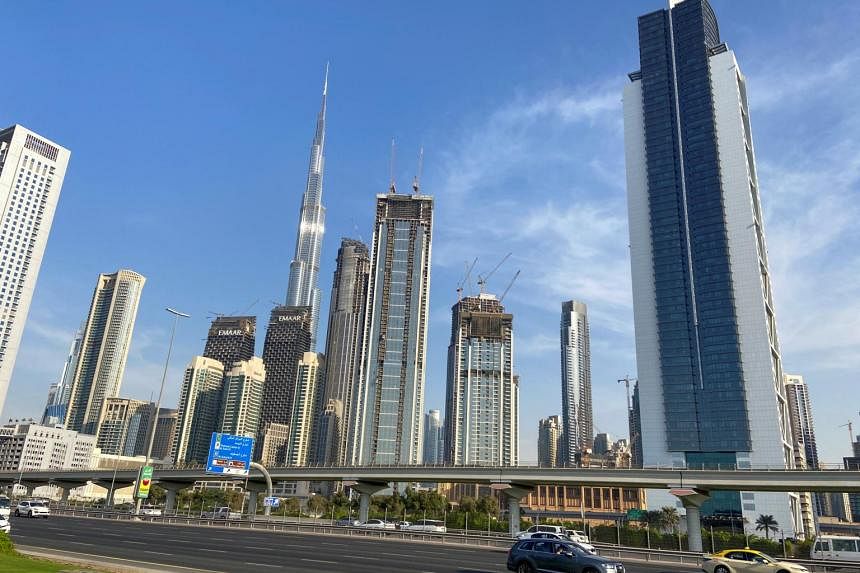SINGAPORE - Major shifts in the Islamic centre of gravity that is the Middle East - from warming geopolitical ties to growing socioeconomic openness - are being watched closely by Muslims in South-east Asia.
And as the practice of Islam in the Middle East evolves, how Muslims on this side of the world react can have significant social consequences for the region here, said Law and Home Affairs Minister K. Shanmugam on Thursday (May 19).
"The countries of the Gulf are taking steps to prepare themselves for a very different world in the decades to come, in a bid to stay prosperous, vibrant, attractive, and they have set out to reform not just their economies, but also their societies," he noted.
In a keynote speech on the second day of the Middle East Institute's (MEI) annual conference, held virtually this year, Mr Shanmugam noted that economic inter-relations between the Middle East and South-east Asia were also likely to expand, with big investments in the latter region.
The MEI is an autonomous research institute within the National University of Singapore.
With South-east Asia boasting a young population of 600 million people and a continually growing economy that, taken as a whole, is already one of the top 10 in the world, there will be opportunities aplenty and competition for talent, said Mr Shanmugam.
"The Gulf, for example, is already attracting a large number of Asians to work, play and live there. And that is part of the reason they are changing their whole environment," he said.
Mr Shanmugam said that changes in the Middle East - including the further normalisation of Arab-Israeli ties and increasingly secular attitudes - would also affect the balance of power there, with states acting in their best interests, depending on the issue at hand.
"It is not a given that the shifts that we see will result in the region being divided into two blocs, with Iran on one side and its allies, and the Gulf states on the other," he said. "Nor is it clear that the sides are any closer (despite) diplomatic initiatives. But many think that there is room for some guarded optimism."
Earlier in his speech, Mr Shanmugam, who was foreign minister from 2011 to 2015, spoke of significant regional re-alignments in the Middle East, citing among other instances Turkish President Recep Tayyip Erdogan visiting Saudi Arabia on April 28 this year for the first time in more than four years.
The two nations have a strained relationship owing to past hostilities and Mr Erdogan's trip has been viewed by observers as an attempt to repair ties.
But perhaps the most substantial change, said Mr Shanmugam, has been the Abraham Accords - brokered by the Trump administration in 2020 to formally normalise diplomatic and economic ties between Israel, Bahrain, the United Arab Emirates (UAE) and the United States.
"Others have their ties too, growing stronger, but on the quiet," said Mr Shanmugam.
In late March, Israel also hosted a historic summit in its Negev desert, which was attended by the Egyptian, Emirati, Bahraini and Moroccan foreign ministers as well as their Israeli and American counterparts.
"The once unthinkable has become more than thinkable. It has become reality. Facts are changing fast," said Mr Shanmugam. "The details about the summit are few, but they point towards further normalisation of the Arab-Israeli relationship."
In the context of all these changes, one question is how the Muslim-majority countries in South-east Asia will react, he added.
Mr Shanmugam noted that significant experiments in different economic and social approaches were also taking place in the Middle East.
In Saudi Arabia, for instance, women are no longer required to put on the hijab and are allowed to drive and work. Concerts by Western acts, and cinemas, have also returned to the kingdom.
Mr Shanmugam then recounted a short film that was shown at the Saudi Arabian pavilion at the Dubai World Expo this year, starring the American actor John Travolta and featuring lines such as "one of the greatest melting pots in the world".
"Five years ago, even three years ago, I think one would not have automatically associated such language… with Saudi Arabia," said Mr Shanmugam. "This is a vision. Observers have commented, it is coming from the top, it has to percolate down and be accepted, and that is work in progress."
The UAE, too, is moving towards some laws based on a more secular footing - for example, by decriminalising alcohol consumption and cohabitation of unmarried couples.
"The approach is that Dubai, in particular, is a cosmopolitan place, it's open for business, welcomes people from all over the world," said Mr Shanmugam, describing a buzz, energy and drive to change and move when he was there last month.
The UAE is also promoting itself as a nation of interfaith tolerance and harmony, with active congregations of other religions and a Ministry of Tolerance spearheading efforts.
Elsewhere in the Gulf, Qatar will host the football World Cup later this year and the presence of thousands of fans will in itself create a changed dynamic, Mr Shanmugam observed.
All these shifts are driven in large part by countries seeking to diversify their economies, change attitudes, change the social compact and bring in talent from around the world, said the minister.
"One key question is if the changes can be continued through, and whether the forces unleashed by the changes can be managed, or whether the reactions might be very strong and difficult to manage," Mr Shanmugam said.
"What we can say is the leaders in charge seem to know what they are doing, and they will seek to manage them."


